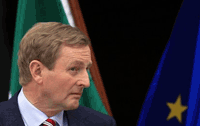
Ireland backs new EU fiscal treaty
Dublin, June 2, 2012
Irish voters backed the European Union's new fiscal treaty in a referendum yesterday, saving Europe a major headache but leaving the government little time to celebrate as problems across the euro zone continue to weigh at home.
The government had campaigned for voters to back the treaty, arguing that a rejection would hurt Ireland's chances of attracting the investment it needs to recover and raise serious concerns about the country's funding prospects.
Dublin's attention can now return to a months-long campaign to refinance much of its bank debt and Prime Minister Enda Kenny said that debt must form part of the comprehensive solution that was needed to fix Europe's banking sector.
Final results showed only five constituencies out of 43 voted "No" to the German-led plan for stricter budget rules, with 60 per cent of the electorate coming out in favour. Two government sources said the treaty was likely to pass by a margin of more than three to two, citing polling data.
Ireland has been held up by its European partners as the poster child for austerity, implementing a 85 billion euro ($106bn) EU/IMF bailout to the letter as others, notably Greece, remained the centre of euro zone debt concerns.
Yet Ireland desperately needs Europe's woes to ease if it is to rack up the kind of export-led growth required to pay down its debt - set to peak at a dangerously high 120pc of gross domestic product next year - and ease unemployment.
Ireland is the only country that will put the fiscal treaty to a referendum. The treaty needs the approval of only 12 of the 17 euro zone countries to be ratified, but an Irish rejection would have undermined one of Europe's key initiatives just as problems mount in Spain and Greece. Analysts said the 'Yes' vote would give Ireland a better chance of getting back to bond markets as planned next year.
Data showed that deposits held by Ireland's domestic banks rose to a 14-month high in April.
Irish manufacturing accelerated in May with the NCB Purchasing Managers' Index climbing to 51.2 from 50.1 in April to boost employment growth in the sector.
The modest growth meant Ireland remained the only country in the euro zone showing growth in the amount of goods and services companies are purchasing, putting it way ahead of Germany's 45.2 and the euro zone average of 45.1.







